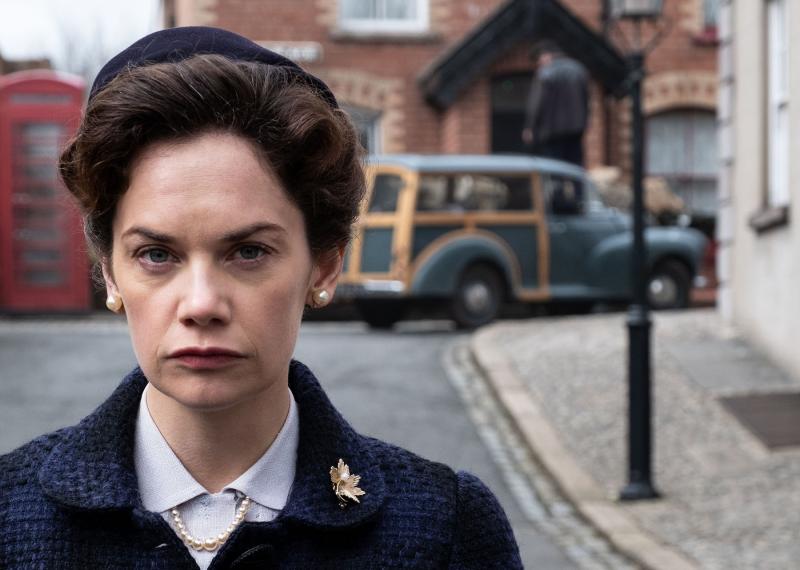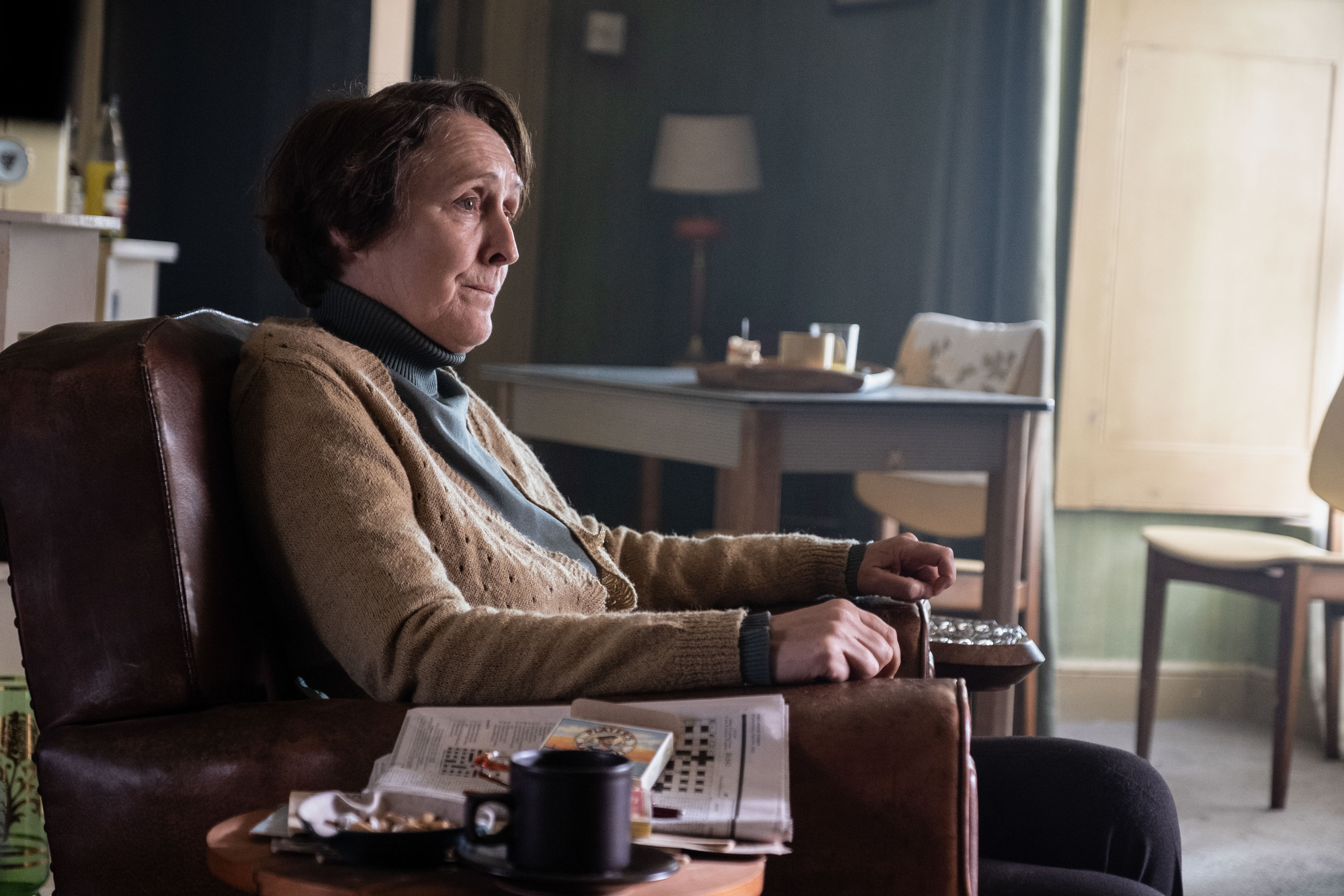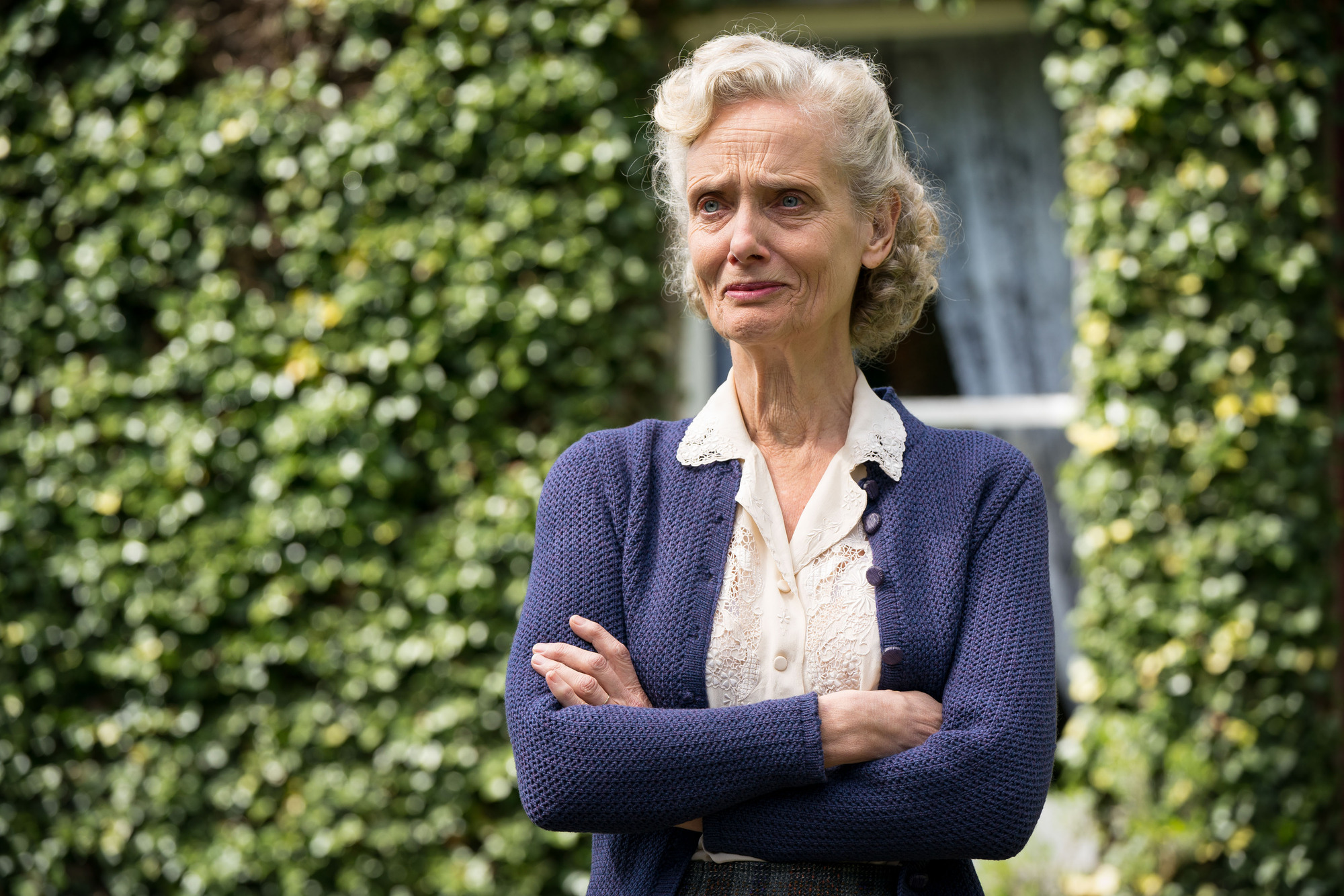Mrs Wilson finale, BBC One review - stranger than fiction | reviews, news & interviews
Mrs Wilson finale, BBC One review - stranger than fiction
Mrs Wilson finale, BBC One review - stranger than fiction
Alison Wilson's search for the truth keeps turning up new mysteries

As the priest said, "Understanding comes first, then forgiveness". Thus the rather enjoyable (if slightly overstretched) Mrs Wilson came to a not exactly happy, but certainly forgiving, ending. Ruth Wilson held the screen over three episodes of this period drama, playing her own real life grandmother Alison Wilson.
Upon his death in 1963, Alison discovered that her husband had not just lied to her about divorcing his first wife, but that there were at least two other women who believed they were the sole Mrs Wilson; he had fathered seven children in all. Ruth Wilson was just one of a tribe of descendants glimpsed in the final credits of her tribute to her rogue of a grandfather.
 The final episode exemplified that old adage that truth often proves stranger than fiction, and we were still left with loose ends as the Foreign Office has refused family historians access to all their files on Alexander Wilson. Author of romances and espionage thrillers, he met Alison Wilson during the war when MI6 made use of Wilson's foreign language skills to eavesdrop on foreign embassies. She typed up his translations and fell in love. He told her he had divorced his first wife, soon they were married with two small sons. But did the Secret Service carry on using Wilson as he claimed when he disappeared abroad for months or went to prison, or was something else going on?
The final episode exemplified that old adage that truth often proves stranger than fiction, and we were still left with loose ends as the Foreign Office has refused family historians access to all their files on Alexander Wilson. Author of romances and espionage thrillers, he met Alison Wilson during the war when MI6 made use of Wilson's foreign language skills to eavesdrop on foreign embassies. She typed up his translations and fell in love. He told her he had divorced his first wife, soon they were married with two small sons. But did the Secret Service carry on using Wilson as he claimed when he disappeared abroad for months or went to prison, or was something else going on?
Fiona Shaw (pictured above) reprised her Killing Eve role as Wilson’s bitter MI6 handler. Shaw’s lack of vanity as an actor was to the fore as, dressed in saggy cardigans and with scraggy hair, she eyed up the grieving yet graceful Alison with utter exasperation. Stabbing fried eggs into her mouth, Shaw warned his desperate widow that she should not dig too deep into Wilson’s past as she would not like what she would find. Certainly he was a fantasist, as Mrs Wilson discovered when she travelled to the stately home he claimed was his family heritage and found that it was just a nursing home in which he’d recuperated in during the Great War. But there were unresolved meetings with his Indian friend, Karim (Anupam Kher) who claimed that Wilson had been a victim of double agents working within the Secret Service.
 Through it all, his widow tried to protect her two sons from the emotional damage of utter disillusionment about their father while still trying to discover the truth for herself. There was a sense throughout the drama, which Ruth Wilson also executive produced, that there was a very personal need to find the good in her grandfather, not just portray him as a serial bigamist and conman. It made for a complex, nuanced drama with some excellent performances not just by Shaw and Wilson but also from Barbara Marten (pictured above left) as her frosty, disapproving mother and Keeley Hawes as his scornful third wife, Dorothy.
Through it all, his widow tried to protect her two sons from the emotional damage of utter disillusionment about their father while still trying to discover the truth for herself. There was a sense throughout the drama, which Ruth Wilson also executive produced, that there was a very personal need to find the good in her grandfather, not just portray him as a serial bigamist and conman. It made for a complex, nuanced drama with some excellent performances not just by Shaw and Wilson but also from Barbara Marten (pictured above left) as her frosty, disapproving mother and Keeley Hawes as his scornful third wife, Dorothy.
There were some longueurs (one despairing, unanswered phone call too many) and perhaps a little too much loving attention to the period décor, the vintage cars and drooping head scarves. But the cinematography by Hubert Taczanowski, all desaturated blues and browns and claustrophobic framing, was very effectively atmospheric. The camera loves Ruth Wilson, an actor whose face can pivot from despair to joy in a few frames. If she doesn’t win awards for Mrs Wilson, it will be a mystery even greater than her grandfather’s life story.
Add comment
The future of Arts Journalism
You can stop theartsdesk.com closing!
We urgently need financing to survive. Our fundraising drive has thus far raised £49,000 but we need to reach £100,000 or we will be forced to close. Please contribute here: https://gofund.me/c3f6033d
And if you can forward this information to anyone who might assist, we’d be grateful.

Subscribe to theartsdesk.com
Thank you for continuing to read our work on theartsdesk.com. For unlimited access to every article in its entirety, including our archive of more than 15,000 pieces, we're asking for £5 per month or £40 per year. We feel it's a very good deal, and hope you do too.
To take a subscription now simply click here.
And if you're looking for that extra gift for a friend or family member, why not treat them to a theartsdesk.com gift subscription?
more TV
 Murder Before Evensong, Acorn TV review - death comes to the picturesque village of Champton
The Rev Richard Coles's sleuthing cleric hits the screen
Murder Before Evensong, Acorn TV review - death comes to the picturesque village of Champton
The Rev Richard Coles's sleuthing cleric hits the screen
 Black Rabbit, Netflix review - grime and punishment in New York City
Jude Law and Jason Bateman tread the thin line between love and hate
Black Rabbit, Netflix review - grime and punishment in New York City
Jude Law and Jason Bateman tread the thin line between love and hate
 The Hack, ITV review - plodding anatomy of twin UK scandals
Jack Thorne's skill can't disguise the bagginess of his double-headed material
The Hack, ITV review - plodding anatomy of twin UK scandals
Jack Thorne's skill can't disguise the bagginess of his double-headed material
 Slow Horses, Series 5, Apple TV+ review - terror, trauma and impeccable comic timing
Jackson Lamb's band of MI5 misfits continues to fascinate and amuse
Slow Horses, Series 5, Apple TV+ review - terror, trauma and impeccable comic timing
Jackson Lamb's band of MI5 misfits continues to fascinate and amuse
 Coldwater, ITV1 review - horror and black comedy in the Highlands
Superb cast lights up David Ireland's cunning thriller
Coldwater, ITV1 review - horror and black comedy in the Highlands
Superb cast lights up David Ireland's cunning thriller
 Blu-ray: The Sweeney - Series One
Influential and entertaining 1970s police drama, handsomely restored
Blu-ray: The Sweeney - Series One
Influential and entertaining 1970s police drama, handsomely restored
 I Fought the Law, ITVX review - how an 800-year-old law was challenged and changed
Sheridan Smith's raw performance dominates ITV's new docudrama about injustice
I Fought the Law, ITVX review - how an 800-year-old law was challenged and changed
Sheridan Smith's raw performance dominates ITV's new docudrama about injustice
 The Paper, Sky Max review - a spinoff of the US Office worth waiting 20 years for
Perfectly judged recycling of the original's key elements, with a star turn at its heart
The Paper, Sky Max review - a spinoff of the US Office worth waiting 20 years for
Perfectly judged recycling of the original's key elements, with a star turn at its heart
 The Guest, BBC One review - be careful what you wish for
A terrific Eve Myles stars in addictive Welsh mystery
The Guest, BBC One review - be careful what you wish for
A terrific Eve Myles stars in addictive Welsh mystery
 theartsdesk Q&A: Suranne Jones on 'Hostage', power pants and politics
The star and producer talks about taking on the role of Prime Minister, wearing high heels and living in the public eye
theartsdesk Q&A: Suranne Jones on 'Hostage', power pants and politics
The star and producer talks about taking on the role of Prime Minister, wearing high heels and living in the public eye
 King & Conqueror, BBC One review - not many kicks in 1066
Turgid medieval drama leaves viewers in the dark
King & Conqueror, BBC One review - not many kicks in 1066
Turgid medieval drama leaves viewers in the dark
 Hostage, Netflix review - entente not-too-cordiale
Suranne Jones and Julie Delpy cross swords in confused political drama
Hostage, Netflix review - entente not-too-cordiale
Suranne Jones and Julie Delpy cross swords in confused political drama

Comments
I thought Ruth Wilson was